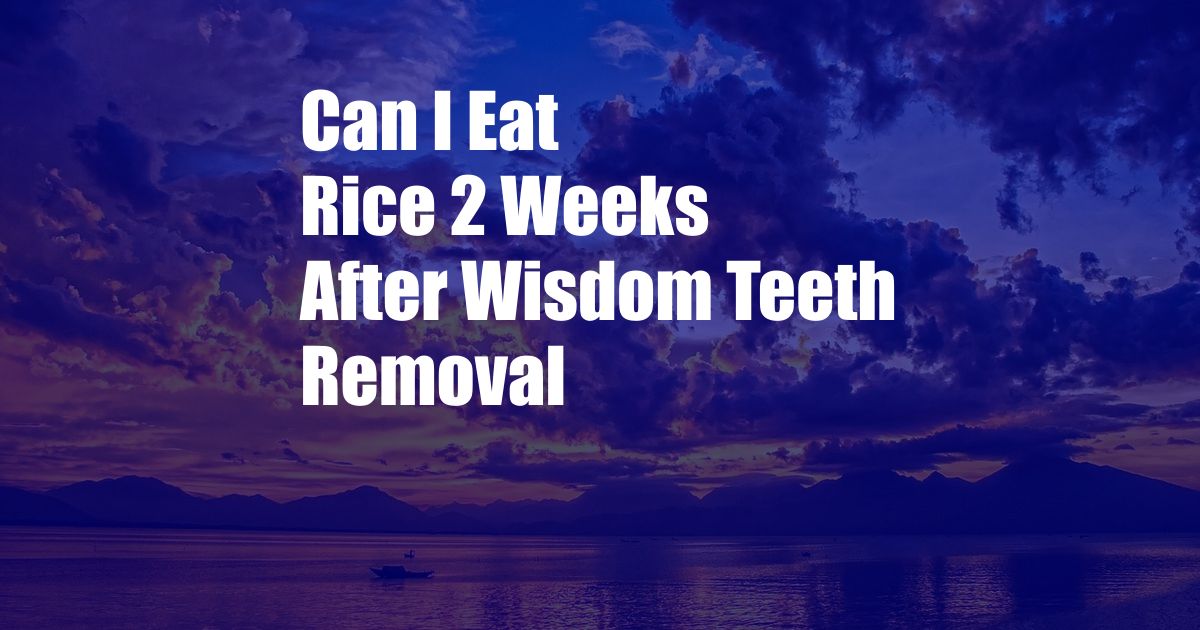
Can I Eat Rice 2 Weeks After Wisdom Teeth Removal?
As I sat in the dentist’s chair, the thought of biting into a plate of fluffy rice seemed like a distant dream. Having just undergone wisdom teeth removal, I was left with a mouth full of stitches, sensitivity, and a strict set of post-operative instructions.
One of the most pressing questions on my mind was the fate of my beloved rice dishes. After all, rice is a staple in my diet, providing comfort and nourishment. However, as I delved into the world of wisdom teeth recovery, I soon discovered that the answer to my rice dilemma was not as straightforward as I had hoped.
Wisdom Teeth Removal and Soft Food Diet
Following wisdom teeth removal, patients are typically advised to adhere to a soft food diet for a period of time. This is because hard and chewy foods can put excessive pressure on the extraction site, causing pain and potentially dislodging the blood clot that forms to protect the healing socket.
Rice, being a soft and easily digestible grain, may seem like an ideal candidate for the post-wisdom teeth removal diet. However, it is important to consider the specific type of rice you choose and the method of preparation.
White Rice vs. Brown Rice
White rice, which has been stripped of its bran and germ, is generally softer and easier to chew than brown rice. This makes it a better choice for patients in the immediate aftermath of wisdom teeth surgery.
Brown rice, on the other hand, retains its bran and germ, which gives it a higher fiber content and a chewier texture. While brown rice is a healthier option overall, it may be more challenging to eat comfortably during the early stages of recovery.
Boiled Rice vs. Fried Rice
The method of preparing rice also plays a role in its suitability for post-wisdom teeth removal. Boiled rice is softer and less likely to irritate the extraction site compared to fried rice, which can be crispy and crunchy.
Fried rice often contains additional ingredients such as vegetables, meat, and eggs, which can make it more difficult to chew and may introduce potential allergens.
Two Weeks After Wisdom Teeth Removal
Two weeks after wisdom teeth removal, most patients have recovered sufficiently to start gradually incorporating more solid foods into their diet. By this time, the extraction site has likely healed enough to withstand the gentle pressure of chewing soft foods.
Therefore, it is generally safe to eat white rice two weeks after wisdom teeth removal, as long as it is boiled and eaten in moderation. However, it is important to listen to your body and avoid foods that cause discomfort or pain.
Tips for Eating Rice After Wisdom Teeth Removal
- Start with small bites and chew slowly.
- Avoid biting directly on the extraction site.
- Opt for plain white rice instead of brown rice or fried rice.
- Add soft toppings such as mashed avocado or yogurt.
- Drink plenty of fluids to help wash down the rice.
FAQ
Can I eat rice with curry after wisdom teeth removal?
It is best to avoid spicy and acidic foods such as curry during the early stages of recovery, as they can irritate the extraction site.
How long should I avoid eating rice after wisdom teeth removal?
Most patients can start eating soft foods, including boiled rice, two weeks after wisdom teeth removal, but it is important to follow your dentist’s instructions.
What other soft foods are suitable after wisdom teeth removal?
Other soft foods that may be appropriate include mashed potatoes, yogurt, smoothies, and soups.
Conclusion
Eating rice after wisdom teeth removal is possible, but it is important to do so gradually and cautiously. By choosing soft, boiled rice and avoiding foods that cause discomfort, you can enjoy your favorite meals while ensuring a safe and comfortable recovery.
If you have any specific concerns or experience any difficulties eating rice or other foods after wisdom teeth removal, do not hesitate to consult with your dentist or oral surgeon for further guidance.